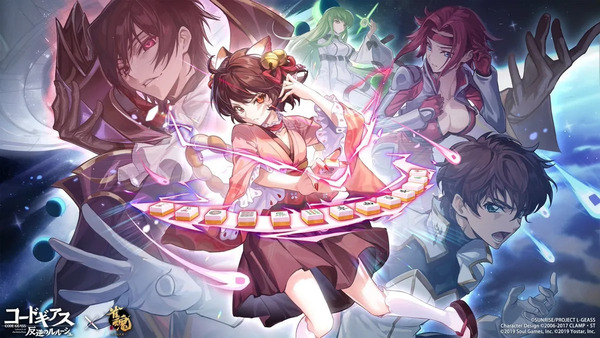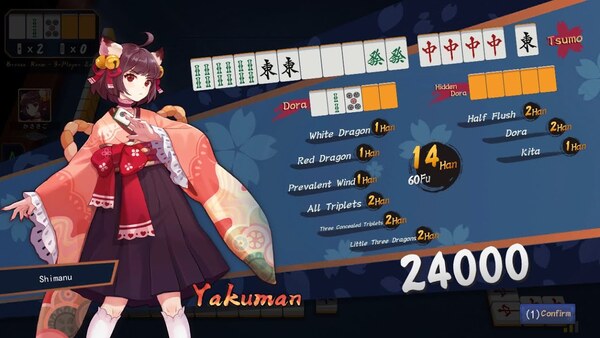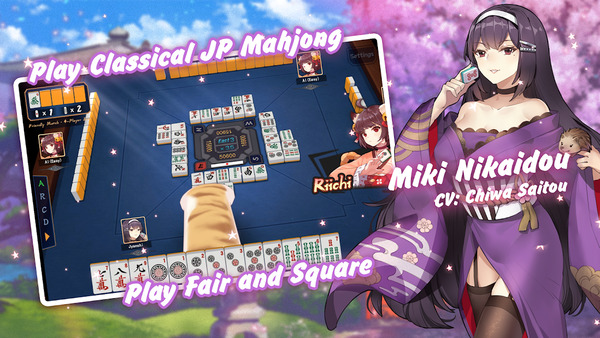Advertisement
Popular Now
Mahjong Soul is a captivating digital version of the classic Japanese riichi mahjong, featuring unique anime-style characters and a dynamic gameplay experience. Whether you are a beginner or an experienced player, understanding the nuances of the game can enhance your chances of success. This guide provides comprehensive tips and guides to help you sharpen your skills and dominate your opponents in Mahjong Soul.




Introduction to Mahjong Soul
Mahjong Soul is an exciting blend of traditional mahjong mechanics and anime character abilities. The game focuses on riichi mahjong, a version of the game that emphasizes strategy, tile efficiency, and tactical use of abilities. To excel, you must combine knowledge of tile combinations with effective use of the characters' special powers. Below, we’ll guide you through the key strategies and techniques that can help you improve your gameplay.
1. Grasping the Basics of Mahjong Soul
Understanding the fundamentals of Mahjong Soul is essential before moving on to advanced strategies. The core rules revolve around building a winning hand of 14 tiles.Tile Groups and Basic Strategies
In Mahjong Soul, your goal is to form a hand with sequences, triplets, or pairs. A sequence is a set of three consecutive tiles from the same suit, while triplets consist of three identical tiles. The key is to efficiently build these combinations by drawing and discarding tiles.Winning Hands and Yaku
A winning hand must include a yaku, which is a special combination or condition in your hand. Learning the common yaku is critical to forming a winning strategy, as each yaku increases the points you can earn.2. Mastering Tile Efficiency
One of the core skills in Mahjong Soul is tile efficiency. By managing your hand with efficiency, you increase the chances of forming a winning hand more quickly.Discarding Isolated Tiles
It’s important to discard tiles that do not fit into a sequence or triplet. Isolated tiles, especially honor or terminal tiles, are less likely to contribute to a winning hand and should be discarded early.Maximizing Your Chances
Focus on forming flexible sequences rather than rigid triplets, as this increases the number of tiles that can complete your hand. For example, holding 4-5 allows for more possibilities than holding 4-4.3. Leveraging Character Abilities
Each character in Mahjong Soul brings unique abilities that can give you an advantage in specific situations. Learning to utilize these abilities effectively is key to outplaying your opponents.Choosing the Right Character
Select a character whose abilities align with your preferred playstyle. For example, some characters have abilities that increase your chances of drawing the tiles you need, while others help you defend against opponents' strategies.Timing Your Abilities
Effective use of abilities depends on timing. Use your abilities during key moments, such as when you're close to completing a hand or need to block an opponent's progress.
4. Understanding Yaku and Scoring
A solid understanding of yaku and scoring mechanics is essential for success in Mahjong Soul. Yaku are the combinations or conditions required for a winning hand.Common Yaku for Beginners
Begin with basic yaku like Pinfu (a hand with no points), Tanyao (all simple tiles), or Riichi (declaring you're one tile away from winning). These are easier to achieve and will help you familiarize yourself with the game's mechanics.High-Value Yaku
As you become more skilled, aim for higher-scoring yaku such as Chinitsu (all tiles of the same suit) or Honitsu (a mix of honor and one suit). These advanced yaku yield more points but require a focused strategy.5. Defensive Play: Avoiding Dangerous Discards
In Mahjong Soul, defense is just as important as offense. While building your hand, you must also be aware of your opponents' strategies and avoid giving them the tiles they need.Identifying Safe Discards
Safe discards are tiles that have already been discarded multiple times or are unlikely to complete an opponent's hand. Pay attention to the discard pile to determine which tiles are safe.Watching for Opponents' Hands
Keep an eye on your opponents' discards and actions. If an opponent declares riichi, they are one tile away from winning, and you should switch to a more defensive playstyle.6. Making Effective Use of Riichi
Riichi is a powerful declaration in Mahjong Soul that signals you're one tile away from a winning hand. However, it comes with risks, so use it wisely.Declaring Riichi at the Right Time
Only declare riichi if you are confident you can draw or receive the tile you need to win. Riichi increases your potential score but also locks your hand, preventing further modifications.Risks of Riichi
Once you declare riichi, your opponents will know you're close to winning. They may switch to a defensive strategy, making it harder for you to get the tile you need. Use riichi only when you're ready to take the risk.
7. Advanced Techniques: Suji and Kabe
For players looking to take their skills to the next level, mastering suji and kabe techniques can add depth to your strategy.Suji Technique
Suji involves using the discards of certain tiles to predict which tiles are safe to discard. For example, if a 6 is discarded, the 3 and 9 in that suit are generally safer, as they are less likely to complete a sequence.Kabe Technique
Kabe refers to walls formed by discarded tiles. If multiple copies of a tile have already been discarded, that tile becomes safer to discard because it's unlikely to complete an opponent's hand.8. Transitioning to the Endgame
The final stages of a match require a change in strategy. In the endgame, players should focus on completing their hands while also avoiding risky discards.Endgame Defensive Play
As the match nears its end, pay close attention to opponents' discards. It’s often better to play defensively by discarding safe tiles rather than pushing for a high-value hand.Risk vs. Reward
In some situations, taking risks can pay off, especially if you're behind in points. However, balancing risk and reward is essential to avoid costly mistakes in the final rounds.9. Improving Through Practice
As with any strategy game, consistent practice is key to improving in Mahjong Soul. Regularly playing matches will help you refine your strategies and learn from your mistakes.Analyzing Your Matches
After each match, review the decisions you made. Could you have discarded differently? Did you take unnecessary risks? Analyzing your matches will help you identify areas for improvement.Playing with Different Characters
Experiment with different characters to learn how their abilities impact the game. Each character brings something unique, and finding one that suits your playstyle can greatly improve your performance.














